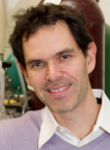Brian Crane named Howard Hughes professor
By Linda B. Glaser

Brian Crane, professor of chemistry and chemical biology in the College of Arts and Sciences, has been named a Howard Hughes Medical Institute (HHMI) professor, one of 15 leading scientist-educators to receive the honor. Each will receive $1 million over five years to create activities that integrate their research with student learning in ways that enhance undergraduate students’ understanding of science.
Crane’s HHMI project will build on Cornell’s successful prefreshman summer program (PSP) that prepares students for freshman chemistry. He and chemistry professor Stephen Lee, who recently revamped the PSP, will extend the program to prepare the students for more advanced chemistry and then initiate them into research experiences.
“Too many students who didn’t have good preparation in their high schools or are underprepared for other reasons get derailed by weak grades in their first couple of years at Cornell,” says Crane. “This HHMI professorship gives me the opportunity to organize a program to try and help these students, engage them in science and hopefully send them on to graduate or medical school.”
Crane explains that the project’s classes are based on intense problem-set learning and peer-led group learning, with an emphasis on interactive exercises.
“The types of problems we give the students really do matter,” says Crane. “Our goal now is to develop similar strategies for the sophomore classes.”
A new course, Chemistry 1070, will incorporate these strategies and will be open to all students as a companion to Chemistry 2070.
Crane’s research focuses on the structure, function and mechanism of protein systems that underlie signal transduction. Projects in his lab include understanding circadian clock light sensors, bacterial transmembrane signaling, nitric oxide enzymology and general aspects of protein electron transfer.
In his announcement of the professorships, HHMI President Robert Tjian praised the new cohort, saying that “exceptional teachers have a lasting impact on students. These scientists are at the top of their respective fields and they bring the same creativity and rigor to science education that they bring to their research.”
Linda B. Glaser is staff writer for the College of Arts and Sciences.
Media Contact
Get Cornell news delivered right to your inbox.
Subscribe